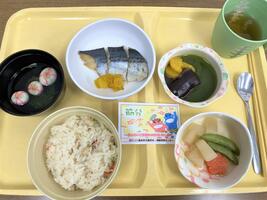Last updated on June 14, 2023.
The text is from here.
Nutrition Department
- Introduction of Nutrition Department
- About nutrition management system
- Meal during hospitalization
- Team medical care
- About nutrition consultation
Introduction of Nutrition Department
The Nutrition Department has four registered dietitians engaged in clinical nutrition management and nutrition guidance, and a total of 45 contractors provide school lunch.
Nutrition is the foundation of treatment, and we provide a large number of dietary species and forms to support the early recovery of disease in order to ensure a safe and delicious meal and therapeutic-effective meal.
About nutrition management system
Our hospital is engaged in consistent treatment and rehabilitation from the acute phase to the convalescent phase.
In cooperation with doctors, nurses, therapists, etc., we manage nutrition in order to contribute to the treatment of illness in the acute phase and to achieve more effective rehabilitation during the convalescent phase.
We regularly monitor and prepare nutrition plans for all patients so that they can understand the changing condition of patients every day.
Bedside visit
For patients who do not progress during hospitalization or are at risk of malnutrition, we visit the bedside and adjust the diet in consideration of the condition and ease of eating.
Pre-in-hospital adjustment
For inpatients scheduled to undergo surgery at Orthopaedic surgery, in cooperation with the Nursing Department, we obtain information on the presence or absence of food allergies, medical history of diabetes, etc., and provide meals suitable for them from the time of hospitalization.
Meal during hospitalization
Characteristics of our diet
We provide about 26,500 meals a month, including meals at the nursing care facility for the elderly.
The menu offers about 70 kinds of meals according to your doctor's instructions according to your illness and swallowing (swung).
Immediately after the onset of stroke, swallowing disorders often occur, so we have four levels based on academic standards so that dietary training can be performed step by step.
[Example of menu]
 Swallowing food 1 Peach jelly, miso soup jelly
Swallowing food 1 Peach jelly, miso soup jelly
 Swallowing food 2 porridge jelly, peach jelly, miso soup jelly, pudding, Neri plum
Swallowing food 2 porridge jelly, peach jelly, miso soup jelly, pudding, Neri plum
Swallowing food 3 All porridge, hampan boiled, chawanmushi (no ingredients), cheese jelly, grape jelly, Neri plum
 Enshita soft vegetarian all porridge, trout cream sauce, potato garlic saute, broccoli egg salad, strawberry mousse
Enshita soft vegetarian all porridge, trout cream sauce, potato garlic saute, broccoli egg salad, strawberry mousse
After that, it is possible to change the size of the knees and bite-sized pieces and customize the presence or absence of thickness so that training can be done in general and special therapeutic foods.
[Example] Simmered mackerel


"Wheat tea jelly,"
This tea jelly is hardened by special cann with gelatin texture.
It is provided as a substitute for tea for those who have tea.
Event food
We hold event meals about twice a month, and we provide meals that allow you to feel the season with cards.
Children's Day
Opening Day

Setsubun
Hinamatsuri
Tanabata
Autumnal Equinox Day
Team medical care
In our hospital, there are many people who need tube feeding management due to stroke and neurological diseases, and many elderly people who have become thinner at home and are malnutrition. Malnutrition can cause disease recovery or rehabilitation to progress.
The Nutrition Support Team (NST) discusses and resolves patients with gastrointestinal problems such as diarrhea and vomiting with nutrients, and patients who have difficulty swallowing and eating from a multidisciplinary perspective. . Therefore, a dietitian discovers nutrition issues and proposes specific nutritional supplement methods with reference to the opinions of multiple occupations.
In addition, we hold regular study sessions in the hospital to disseminate and improve nutrition knowledge.
In addition, we collaborate with multiple occupations in hospital team medical care, such as pressure ulcer control teams, infection control teams, dementia support teams, and convalescent rehabilitation nutrition conferences.
State of the conference
About nutrition consultation
For patients with anxiety about dietary restrictions and dietary restrictions, such as lifestyle-related diseases, malnutrition, and dysphagia, which are risk factors for stroke, we will review our daily diet and give advice on the correct amount and method of diet, and consider specific improvement measures together. We go inpatient and outpatient care in consideration of patient's life and social background.
[Example of Question]
・What is the salt content of 6g?
・How do you make it? What are the points to keep in mind?
・How do you do protein restriction?
・I'm going to eat lately, what should I do?
Inquiries to this page
Yokohama City Apolexy and Spinal Nerves Center
Phone: 045-753-2500 (Representative)
Phone: 045-753-2500 (Representative)
Page ID: 461-883-051







